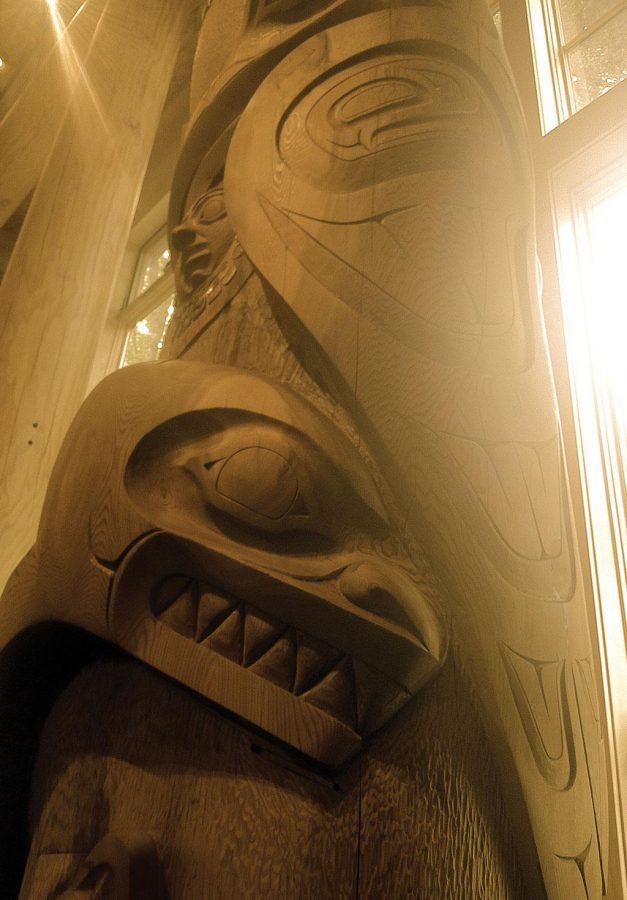Indigenous people “will always be here”
October 14, 2019
Correction: This story has been edited to correct a statement attribute to Roman Cohen.
On Tuesday, the Washington D.C. council voted in favor of the “Indigenous Peoples’ Day Emergency Declaration Act of 2019,” which some Oregon State University students see as an important step toward honoring indigenous history and asserting Native culture.
This bill temporarily replaces Columbus Day, and celebrates Indigenous people, or those whose origins can be linked to the Americas and Pacific Islands, in the U.S. capitol on the first Monday of October. While the bill has been favored by D.C. council members, it still awaits congressional approval. The legislation will expire by mid-May 2020 if no permanent legislation is passed within the next year. Locally, the OSU Native American Longhouse Eena Haws will also be celebrating Indigenous Peoples Day in partnership with the city of Corvallis.
While there is a possibility that Oct. 14 will once again revert back to Columbus Day in D.C., Corvallis has been celebrating Indigenous Peoples’ Day since Oct. 12, 2015. In fact, the State of Oregon has never recognized Columbus Day, but it wasn’t until October 2017 that Governor Kate Brown declared Oct. 14 as Indigenous Peoples’ Day.
Since the 1930s, Oct. 14 has been celebrated as Columbus Day, the anniversary of Christopher Columbus’s arrival in the Americas. In more recent years, there has been a push to shift the attention away from the Italian explorer, and rather, honor the Native Americans who were enslaved and killed by Columbus and his contemporaries, and suffered from the infectious diseases brought to America by the European.
Luhui Whitebear, Ph.D candidate in the OSU Women, Gender and Sexuality Studies program, assistant director of the Native American Longhouse Eena Haws, and Coastal Band Chumash member, hopes to fully abolished a federal holiday celebrating the slavery, murder and rape of Indigenous people for settler gain.
“Whether or not Indigenous Peoples’ Day is a federal holiday in the future, we will always be here, and if we can change the conversations about the day it would replace, that would be great too,” Whitebear said via email.
Oregon State University’s NAL Eena Haws has plans to celebrate the feat with a partnership with the City of Corvallis, as they have for the past five years. This year, the Longhouse will have a couple of guest speakers who will share information about the nine federally recognized tribes of Oregon.
This will take place on Monday at 4 p.m. in the Memorial Union Horizon Room.
Kobe Natachu, a fourth-year nutrition student, leadership liaison at the NAL Eena Haws, and Shiwi Zuni Pueblo, Diné Navajo and Katishtya San Felipe Pueblo Native American, said they feel indigenous people have been erased from history, and still face ongoing harm today, and acknowledging that is what Indigenous Peoples’ Day is all about.
“My hope is that Indigenous Peoples’ Day becomes the norm all across the country, while also opening the door for people to learn about the Indigenous people whose land they occupy,” Natachu said in an email. “Beyond that, I want this to lead to more opportunities for Indigenous people to be seen in the present and not a figure of the past.”
The change in the conversation around Columbus Day has spread across the nation, as multiple cities across America have declared Columbus Day as Native American Day or Indigenous Peoples’ Day in the past decade.
“I’m so proud of the many people who have put in the work to make this happen. Children have grown up believing that Columbus was a hero, and that he discovered America. There was no discovery, he wasn’t a hero, he was a colonizer,” said Roman Cohen, a third-year student double majoring in marketing and business administration, and Raramuri and Apache Native, via email. “That’s the truth people need to hear. Having this conversation shift will be beneficial for Indigenous youth, they’ll grow up having a day in recognition of themselves and their culture and not one that recognizes the oppressor.”
The day not only memorializes the lives lost during the late 1400s, but aims to honor the Natives who were living in the U.S. prior to Columbus’ 1492 arrival and celebrate the Native American culture that is still alive today.
“Indigenous Peoples’ Day means that there is a focus on the Indigenous people, as well as our histories, struggles, triumphs and continued presence on our own lands,” Whitebear said in an email. “It is less about a sanctioned holiday, and more about asserting our indigeneity, for me anyway.”
For Cohen, this holiday celebrates the resilience, perseverance and culture of Indigenous people.
“The end goal is to show people the true history of the Americas and Pacific Islands,” Cohen said via email. “Most people don’t know their history or don’t know the history of the land they inhabit. I think this is a major step, and the end goal is to change the narrative, which will definitely be a journey.”
























































































































